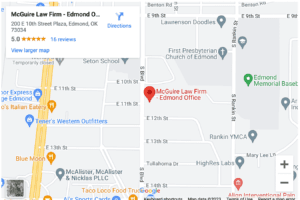Types of Damages Available in Personal Injury Cases

A common question personal injury attorneys answer is, “How much is my personal injury claim worth?” The answer to that question depends on the facts and circumstances of your case.
Many factors can impact the value of your claim. The type and extent of your injuries, your financial losses, and the evidence supporting your claim could affect how much money you receive for damages. If you were partially to blame for the cause of your injury, your compensation could be reduced by your percentage of fault.
We understand that you need maximum compensation for your damages after an accident or injury. It is critical that you receive a fair settlement to continue to heal and recover from an injury that was not your fault. An experienced Oklahoma City personal injury lawyer can help advocate for you to make sure all available damages for your accident are included in the final settlement amount.
Types of Damages Available in Personal Injury Cases in Oklahoma

Understanding the types of damages you can receive for a personal injury can help ensure insurance companies do not take advantage of you. Before settling an injury claim, it is wise to talk with a lawyer about your case. The insurance company always undervalues damages to avoid paying the total value of a personal injury claim.
Once you sign a settlement agreement, it is too late to demand more money. Even if you discover another injury or more damages, you have waived your right to pursue additional claims. Therefore, make sure the amount you agree to accept for settlement is the highest amount possible for your case.
Compensatory Damages in a Personal Injury Case
Compensatory damages for a personal injury case are divided into two categories: economic damages and non-economic damages.
Economic damages compensate an accident victim for financial losses caused by the accident and injuries. General damages (non-economic damages) compensate the person for the pain and suffering caused by the accident or injury.
Examples of the types of damages you could receive for your personal injury claim include:
Medical Bills and Expenses
Medical expenses can be significant in personal injury cases. The more severe the injury, the higher the medical costs.
Examples of medical losses included in injury claims include:
- Emergency room and ambulance bills
- Cost of diagnosing injuries, including CT scans, MRIs, and other diagnostic tests
- Bills from physicians, labs, hospitals, and other medical providers
- Cost of surgery and rehabilitation therapies
- Home health care costs
- Prescription drugs and over-the-counter medications
- Mobility devices and medical equipment
- Nursing and personal care
- Medical supplies
An insurance company may argue that medical expenses were not reasonable or necessary. We refute those arguments with statements from your doctors and medical experts. We can also show cost-comparison data to justify an expense.
Lost Wages and Benefits
If you cannot work because of your injuries, you are entitled to compensation for loss of income.
Loss of income includes, but might not be limited to:
- Wages
- Overtime pay
- Commissions
- Salaries
- Bonuses
- Benefits
- Retirement contributions
- Tips
- Part-time wages from second and third jobs
- Self-employment income
Loss of income includes any compensation you would have earned if not for your injuries. However, you have the burden of proving that you would have earned that income and how much the income would have been if you had been able to work.
Permanent Impairments and Disabilities
If you sustain disabilities or impairments because of an accident, you may receive compensation for loss of use. Loss of use refers to the inability to enjoy certain activities or perform specific tasks. It includes the changes to your lifestyle and quality of life caused by the impairments.
You may also be entitled to compensation for future damages based on permanent impairments.
For example, you may receive compensation for ongoing medical, nursing, and personal care or future lost wages and diminished earning potential. Diminished earning potential is the difference between what you could have earned before the accident and what you can earn now.
Pain and Suffering Damages
Pain and suffering include a wide variety of damages related to your:
- Emotional distress
- Physical discomfort
- Mental anguish
It also includes the loss of enjoyment of life and reductions in your quality of life. Emotional distress can include PTSD, anxiety, and depression. Mental anguish may include embarrassment and grief over significant scarring or disfigurement.
There is no statutory formula used to calculate the value of pain and suffering damages. However, many insurance companies use a multiplier based on the severity of your injuries. They multiply the total financial losses by the multiplier to value pain and suffering damages.
Out-of-Pocket Expenses
The economic loss caused by expenses incurred because of the accident or injury.
These costs might include:
- Travel expenses to and from medical appointments
- Replacement services, such as hiring someone to perform household chores or childcare
- Cost of overnight travel for medical treatments
- Modifications to your home or vehicle because of a permanent disability
You need receipts to prove you incurred these costs. You may also need a statement from your doctor explaining why the costs were necessary.
Loss of Consortium
Loss of consortium claims compensate an accident victim’s spouse for losses caused by their partner’s injuries.
For example, a car accident victim’s spouse may file a claim for loss of:
- Companionship
- Affection
- Comfort and care
- Sexual relations
- Ability to have children
- Household services and childrearing
It is up to the spouse to prove that the injuries have caused the spouse to incur this loss. The value of these losses depends heavily on the type and severity of the victim’s injuries.
Non-Compensatory Damages in a Personal Injury Case
Punitive damages do not compensate the accident victim for losses. Instead, these damages “punish” a defendant in a lawsuit for intentional wrongdoing or gross negligence. Oklahoma Statutes Title 23 §9.1 explains when punitive damages may be awarded.
You can only receive punitive damages if you file a personal injury lawsuit. Insurance companies do not include punitive damages in settlement agreements.
However, these damages are only awarded in a small number of personal injury cases. Additionally, there is a cap for the amount a jury may award for punitive damages.
Contact Our Oklahoma City Personal Injury Lawyers for a Free Consultation
You deserve to be compensated fully for damages caused by another person’s negligence. If you have been injured in an accident, call our law office today to schedule a free consultation with an experienced Oklahoma City personal injury attorney. We are here to provide legal advice, support, and guidance as you seek justice after an injury or accident.

